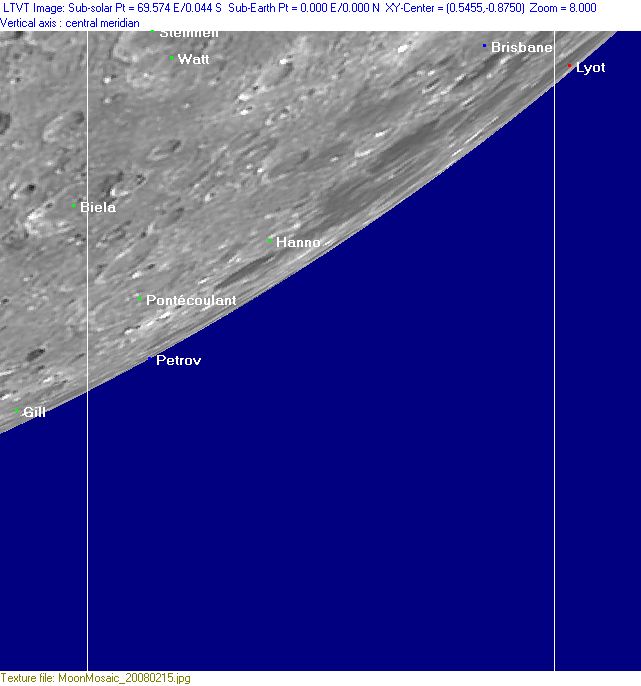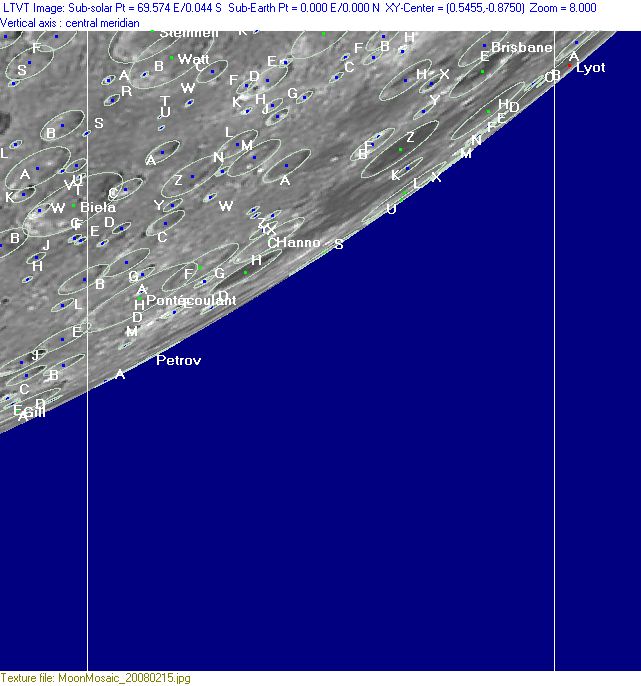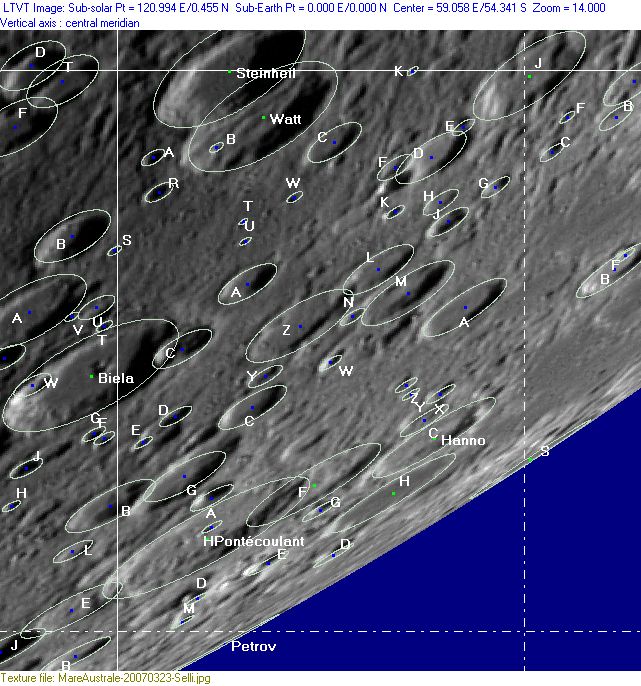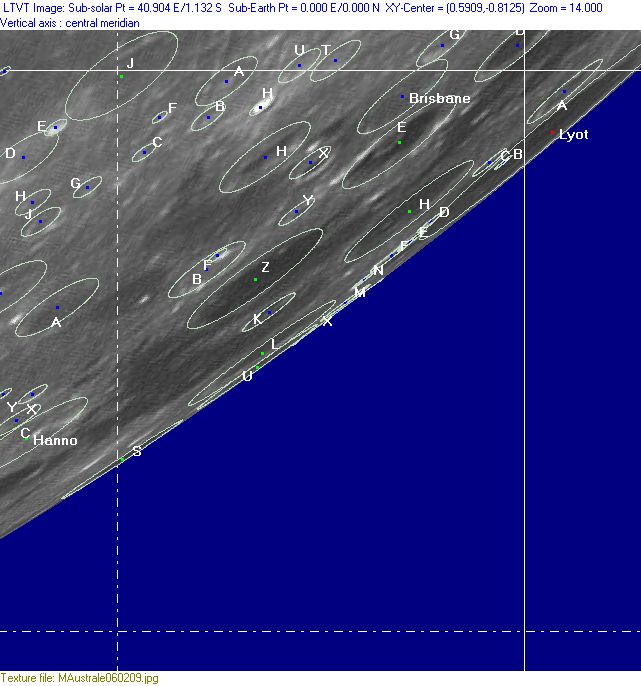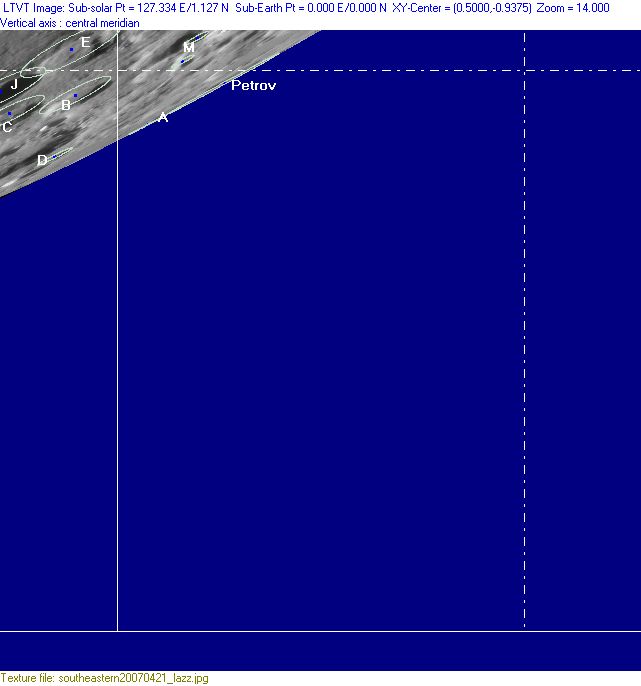Rükl 76
Contents
Rükl Zone 76 - WATT
Neighboring maps on the Rükl Nearside Map:
Table of Contents
[#Rükl Zone 76 - WATT Rükl Zone 76 - WATT]
[#Rükl Zone 76 - WATT-Photographic Map Photographic Map]
[#Rükl Zone 76 - WATT-Nearside Named Features Nearside Named Features]
[#Rükl Zone 76 - WATT-Farside Named Features Farside Named Features]
[#Rükl Zone 76 - WATT-Lettered Crater Locations Lettered Crater Locations]
[#Rükl Zone 76 - WATT-Lettered Crater Locations-Full zone with lettered craters Full zone with lettered craters]
[#Rükl Zone 76 - WATT-Lettered Crater Locations-Lettered craters by quadrants Lettered craters by quadrants]
[#Rükl Zone 76 - WATT-Additional Information Additional Information]
[#Rükl Zone 76 - WATT-Why is Brisbane Z called ORIS by some? Why is Brisbane Z called ORIS by some?]
| 76 |
||
Photographic Map
(This map is based on an Earth-based photograph that has been computer-corrected to zero libration. The vertical white lines indicate the left and right boundaries of the Rükl rectangle)
Background image source
Nearside Named Features
- Brisbane
- Claramontius (Riccioli's disallowed name for a low-albedo region, perhaps Mare Australe?).
- Dorsum Brisbane H (an unofficial name from D.Caes for the wrinkle ridge south-southeast of Brisbane H).
- Dorsum Brisbane Z (an unofficial name from D.Caes for the wrinkle ridge running across the floor of Brisbane Z, aka Oris).
- Hanno
- Lyot
- Oris (an unofficial name for Brisbane Z, see Additional Information below).
- Petrov
- Pontécoulant
- Pratdesaba (a disallowed name from H.P.Wilkins for Brisbane G, although several sources say it was Lyot).
- Steinheil (Van Langren's Zamosci, together with Watt).
- Terra Fertilitatis (Riccioli's discontinued name for the whole of Chart 76).
- Vallis Brisbane Z (an unofficial name from D.Caes for the pronounced groove immediately south of Brisbane Z, noticeable on Lunar Orbiter 4's photograph LOIV-178-h3, North is toward the bottom of the frame).
- Watt (Van Langren's Zamosci, together with Steinheil).
Farside Named Features
(The following features are not formally included in the present Rükl rectangle, but they are adjacent to it and their centers are less than 10° beyond the mean limb -- so they may be seen here in whole or in part with a favorable libration)
Lettered Crater Locations
(click on the thumbnails to view full-sized images; use browser BACK button to return to this page)
Full zone with lettered craters
Lettered craters by quadrants
(the dashed white lines are the centerlines of the Rükl zones)
| North West |
North East |
| South West |
Additional Information
- Other online descriptions of features in this Rükl map section:
Why is Brisbane Z called ORIS by some?
- ORIS. This name is (or was?) used repeatedly by Gillis and Spudis for a crater at 53°S/72°E in their 1998 paper describing far-side mare basalts. Appears to be a reference to Brisbane Z. Origin of, and reason for, non-standard name unknown. Noticed by Stephen J. Saber.
- Why the name ORIS on the moon? I think I have the answer, or perhaps it's just a far-fetched hypothesis... The origin of the name ORIS (Brisbane Z) is a difficult one, because all you get from the internet is an awful lot of photographs of luxury wristwatches from the Swiss company ORIS, and a Wikipedia-page about that company, but wait a minute... there seems to have been something in 1968 related to astronomy, because in that year ORIS obtained full chronometer certification from the Neuchatel Observatory for movement cal.652 (don't ask me about the meaning of movement cal.652, I don't know). NOW... could it be that the moon's southeastern limb crater Brisbane Z (our ORIS) was used as a signpost or landmark for occultations of stars or planets, and that the exact time of reappearance of the occulted star (or planet) was measured with a chronometer (or watch) from the ORIS company? I know, it looks far-fetched, but maybe this could be the reason why limb crater Brisbane Z was called ORIS... See: Neuchatel Observatory, and: ORIS (Swiss company of luxury wristwatches). - DannyCaes DannyCaes Oct 10, 2015
This page has been edited 1 times. The last modification was made by - tychocrater tychocrater on Jun 13, 2009 3:24 pm - mgx2
